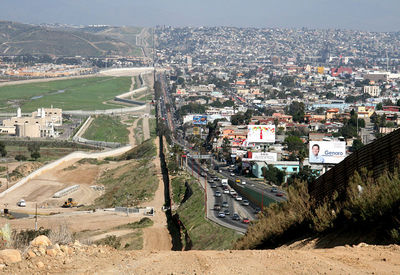 Our “neighbor to the south” is finally receiving some long overdue attention, albeit for undesirable reasons. Mexico’s crisis is stealing headlines here in the U.S., a difficult task during an economic crisis. Without a moment to spare, the White House has announced that President Obama is planning a visit to Mexico. In fact, President Felipe Calderon can expect an impressive parade of guests over the next couple of weeks: “Secretary of State Hillary Rodham Clinton will visit Mexico next week, followed by Atty. Gen. Eric H. Holder Jr. and Secretary of Homeland Security Janet Napolitano in early April, and President Obama shortly after that.”
Our “neighbor to the south” is finally receiving some long overdue attention, albeit for undesirable reasons. Mexico’s crisis is stealing headlines here in the U.S., a difficult task during an economic crisis. Without a moment to spare, the White House has announced that President Obama is planning a visit to Mexico. In fact, President Felipe Calderon can expect an impressive parade of guests over the next couple of weeks: “Secretary of State Hillary Rodham Clinton will visit Mexico next week, followed by Atty. Gen. Eric H. Holder Jr. and Secretary of Homeland Security Janet Napolitano in early April, and President Obama shortly after that.”
The label “failed state” has repeatedly been applied to Mexico. Jorge Castaneda, former Mexican Foreign Minister and fellow at the New America Foundation, recently made the case against this erroneous label, “The government represents the nation abroad, exercises a quasi monopoly on the use of force within its borders, collects taxes and ensures the integrity of its citizens against perils from within and without. By these measures– indeed by any standard definition of a failed state–Mexico is clearly acquitted.” While Mexico’s current state may not warrant the exasperating label “failed” it surely deserves more attention and cooperation than the U.S. traditionally offers.
Forty percent of Mexico’s citizens survive on less than $2 per day; an unacceptable figure for a nation that shares a 2,000 mile border with the World’s richest (and arguably most generous) nation. Policy makers have simply overlooked Mexico time and again. Mexico has been just stable enough to ignore. The FY2009 budget allocates little more than $500million in foreign assistance to Mexico or one-third what we annually offer Egypt. Mexico is our next door neighbor; for the sake of regional stability and national security the United States must invest in Mexico and its leaders. While Mexico is not a failed state, it is facing a crisis the United States cannot afford to ignore. President Felipe Calderon does not lack the will to fight the drug lords and corruption, but the resources. The legitimate economy of Mexico is severely undermined by two shadow economies that are difficult to track and impossible to tax. The drug economy is estimated at $10billion to $50billion and revenue from remittances in 2008 was around $25billion.
In December 2008 the U.S. government committed $400 million to support the Mexican government in their battle with gangs and drug lords. While I appreciate the gesture as a show of support for Calderon, this amount is insufficient to address the crisis that Mexico is now facing. More than a neighborly handout, the U.S. government must shoulder some of the responsibility for stopping this crisis; U.S. consumption is the driving force of the Mexican drug economy. Here’s an idea… let’s divert the billions of dollars set aside to build the atrocious border fence to strengthening the Mexican government and civil society. An investment in stabilizing our neighbor will do more for regional security than a wall that would only cause greater disparity between the two nations. Mexico’s greatest need appears to be police training and better armament, but I would also suggest a substantial investment in civil society. Mexico must be equipped to fight the drug lords; but this is not merely a gunfight, this is political struggle. Mexico needs money for alternative livelihood training, education, strengthening the judicial system and civic engagement. Empowering people is the best way to fight corruption.
Mexico’s process of democratization has left a power void that the drug lords happily filled. I see two ways to reclaim power from the drug lords: the state can re-consolidate power into a strong, centralized state relying heavily on the army–which would be a reversal of their recent democratization– or they must push ahead with the democratization and decentralization process. Which means local governance, with an uncorrupted police force and judicial system supported by civic participation, will prevail. I believe the latter is necessary for Mexico to not only survive the drug war but to thrive as a prosperous, democratic nation.
Presidents Obama and Calderon have much to discuss in their upcoming meeting; my hope is that Obama makes a significant commitment to the people of Mexico. We support you, we respect you, and we want you to succeed.
— Faith Smith


25 comments on “Mexico: So Close and Yet So Far”